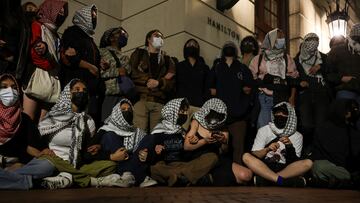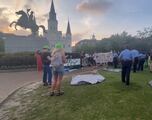Watch: Columbia University students occupy Hamilton Hall
Students at Columbia University defied a deadline to remove themselves from a two-week encampment as part of a Pro-Palestine demonstration.

In scenes reminiscent of those in 1968 during the Vietnam War and 1985 during the time of apartheid, Hamilton Hall at Columbia University was taken over by students protesting the war in Gaza and demanding freedom for Palestine.
Many students began an encampment two weeks ago and were given a deadline to be gone by Monday 2 p.m. ET, but they refused, surpassing the deadline and then occupying the Hamilton Hall building. The university had already begun to suspend those who defied the deadline, banning them from the campus and prohibiting those who were meant to graduate this year from doing so.
The protesters barricaded themselves inside, breaking windows and with some allegedly holding workers hostage inside before finally letting them go, according to student newspaper, the Columbia Spectator.
Doors to the building were shut and blocked off with tables, chairs, and other large objects with some even locked with zipties and ropes. Outside of the building, more protesters formed a human chain, linking arms and chanting, “From the river to the sea, Palestine will be free” and “Palestine will live forever.”
This demonstration is just the latest of several across college campuses throughout the United States, with one even taking place in a New Orleans square on Monday. The University of Texas at Austin had a similar protest on Monday and several people were arrested after failing to take down their tents.
What do the pro-Palestine supporters want from these protests?
The reason these protests are happening mostly on college campuses is because the students are asking the universities to financially divest from Israel. To divest means to sell or drop financial ties. Many of these schools have massive endowments.
It was Columbia University that sparked the protests throughout the U.S. and more than 100 students were arrested on April 18 when the police raided an encampment in the middle of the campus. That only led to the protesters setting up a new encampment and becoming more stubborn in their efforts.
These protests have led to concern for the safety of Jewish students. Some protesters have thrown out hate speech and threats of violence. New York Republican congresswoman Elise Stefanik accused Columbia University of “empty threats and weak leadership”. “The world is watching as you continue to fail your Jewish students,” she said.
Columbia University president, Dr. Minouche Shafik, said that the school “will not divest from Israel” and that they are attempting to address student concerns in a variety of ways after talks between student organizers and academic leaders failed to result in the take-down of the encampment.


Complete your personal details to comment